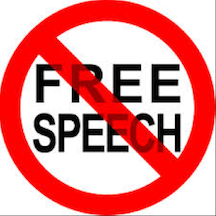Bullying
Principle Number Nine: Freedom of Speech
This precious freedom is essential for a harmonious and healthy society.
Posted January 28, 2014
This is an installment in a series called "Ten Principles for Moral Discipline." They are meant to form the basis of a moral, effective school bullying policy. These ideas are thousands of years old. I am merely applying them for use in today's schools.
Many of us in the modern world have come to take freedom of speech for granted. In fact, we have so greatly lost appreciation of its value that we are eagerly getting rid of it, especially in our schools. At popular urging, every state in our Union has passed anti-bullying laws that radically curtail this freedom. In the hope it will put a stop to bullying and create a more civil society, we are making it a crime to say anything that anyone might find offensive. However, the tougher the laws are, the more time and energy schools must invest in prosecuting children for what they say to each other, and the more the hostilities escalate among students, parents, and staff.
Our Founding Fathers (U.S.) were very wise people. They studied philosophy intensively and deliberated greatly over everything they put in the Constitution and Bill of Rights. Though few of us realize it, we citizens of democracies enjoy an unprecedented degree of abundance, opportunity, cultural enrichment, and safety because of the wisdom they showed in guaranteeing us freedom of speech.
Would you like to live in a society in which the government can do anything it wishes and reporters are only permitted to report what the government wants us to know?
Would you like to live in a society that indoctrinates you from early childhood in an official set of beliefs and punishes you for challenging them?
Would you like to live in a society in which all of our interpersonal interactions are the business of government officials…in which we can be investigated and punished for saying anything that can upset anyone…in which we must pretend everyone is perfect no matter what is obviously wrong with them…in which we are forbidden from using humor and satire because we might hurt someone’s feelings…in which we are required to inform on each other to the authorities when we witness the other saying something potentially offensive to a third party?
Such societies have existed and still do, and our Founding Fathers intended to prevent our country from becoming one of them. They understood that a healthy, evolving society that maximizes human happiness requires permitting us to say words other people don’t like to hear, to challenge popular thinking and even to publicly criticize the government, all without fear of punishment. They understood that it is healthy for us to be free to criticize and insult each other—even if we may be wrong—so that we can become aware of what’s wrong with us and make an effort to improve if we wish. They understood that our feelings are in our own control…that if someone criticizes or insults us, it is entirely up to us whether we get upset or feel grateful. They understood that humans are intelligent beings capable of entertaining opposing ideas and beliefs, yet still be on the same side. They understood that if we get the authorities involved when we feel verbally offended, rather than reducing the hostility between us, it would make us hate each other and want to escalate to physical offense. We would also hate the authorities that punished us.
Freedom of speech is, in reality, the Constitutional version of the traditional slogan, “Sticks and stones may break my bones but words will never harm me.” That slogan expresses the fundamental difference between physical aggression and verbal aggression. Physical aggression causes objective harm. It means that if you do it to me, you are the one who harmed me. Words cause subjective harm. It means that if you say them to me and I feel hurt, I really hurt myself. In fact, you may have even been trying to help me by letting me know what’s wrong with me. But instead of appreciating what you said, I felt offended. Should you be punished because I upset myself?
Punishments for offensive words are likely to be far worse than the crime and are thus immoral. (See the previous Principle: An Eye for an Eye.) If you are not sure about this, ask yourself the following. In most schools today, the punishments for insults are suspension, and after a couple of suspensions, expulsion from school. What would you rather have me do to you: insult you three times, or get you suspended and then expelled from school?
Freedom of speech is mandated by the Golden Rule. Just as we want to have the freedom to say what we want without being punished, we need to let others say whatever they want—no matter how much we don’t like it—and not punish them.
Freedom of Speech does not imply that it is moral or wise to indiscriminately say things that can hurt people’s feelings. It just means that it’s not a punishable offense. If we wish to behave morally and wisely, we need to be heedful of our own words. Furthermore, there are natural consequences to our speech. If we offend people they will not like us. They may refuse to be our friends and even turn others against us. Over time, people's responses guide us to figure out how to talk acceptably. To have satisfying social lives, we need to learn to be nice, not be forced to be nice.
Note: Freedom of speech does not protect speech that can cause objective harm to people’s bodies or property or deny them liberty. We are not allowed to yell “fire” in a crowded theater, to make up lies about our colleagues and get them fired, or to threaten or incite violence. Freedom of speech only protects speech that can hurt people’s feelings.
Moreover, freedom of speech is the solution to most bullying, because most acts of bullying are verbal, and most physical attacks begin with words. When we try to stop people from insulting us, they do it even more. When we allow them to insult us, they quickly stop.
What about profanity? Is it covered by freedom of speech? You can see the power of freedom of speech for handling profanity in the following video clip.
Because freedom of speech is so important, any attempts to limit it should be undertaken with great caution and reluctance.

Unfortunately, anti-bullying laws are completely eradicating freedom of speech and turning our country into the type of repressive society from which our Founding Fathers wanted to save us. Schools and universities no longer routinely teach the meaning and value of freedom of speech because social scientists have come to believe that the most devastating thing that can happen to a person is for someone to say something that could offend them. They believe that freedom of speech is the enabler of offended feelings rather than the solution. They have replaced the conclusion of the “sticks and stones” slogan with “but words can scar me forever” and “but words can kill me.” This modern indoctrination unwittingly encourages us to get terribly upset when people criticize or insult us…and when we get upset, they are likely to continue insulting us. As a result, bullying is becoming an epidemic in the modern world.
If we truly wish to reduce bullying, create a more harmonious school environment, while raising children who are emotionally resilient, we need to intensify our teaching of the meaning and practice of freedom of speech. We need to teach that others have the Constitutional right to say what they want and there is no need for us to get upset by it.
[For a detailed exposition on the importance of freedom of speech and how it is being undermined in our institutions of higher education, read Grug Lukianoff's book, Unlearning Liberty]
*******
Read next installment in this series:
Principle #10: Education Is the Highest Form of Charity
Read previous installments in this series:
Ten Principles for Moral Discipline: Introduction
Principle Number One: The Road to Hell is Paved with Good Intentions
Principle Number Two: Actions Speak Louder Than Words–Or–Practice What You Preach
Principle Number Three: The Golden Rule
Principle Number Four: Justice Makes Right
Principle Number Five: Love Your Enemy
Principle Number Six: Turn the Other Cheek
Principle Number Seven: Do Not Judge
Principle Number Eight: An Eye for an Eye
We have also created a proposal for a moral, effective school bullying policy based on the Golden Rule. We welcome you to use it, and if you like it, recommend it to your school administration.
Author's Policies Regarding Comments: 1. I rarely respond to comments because I simply don't have the time. If I don't respond to your comment, please don't take it personally. 2. Psychology Today has a strict policy about nasty comments. I believe in free speech and rarely censor comments, no matter how nasty. Every nasty comment by adults––especially by ardent anti-bullying advocates––illustrates how irrational it is to expect kids to stop engaging in bullying.




